PAST PROJECT
Somalia: Strengthening Infrastructures for Peace and Fostering Inclusive Dialogue in Galmudug State

The project seeks to support Infrastructures for Peace (I4P) and raise awareness on the nexus between climate change and conflict.
Timeframe: 2021 - 2022
Since the regional elections in 2020, Galmudug State has experienced a period of relative political stability. But long-standing conflicts over political power, land and natural resources have increased the need for social reconciliation across the state and between its various communities. Many Somalis in Galmudug from both the political level and civil society are already working tirelessly for peace in their communities. The Berghof Foundation will support these efforts by supporting a network of peacebuilders throughout Galmudug and enhancing the already existing capacities of these peacebuilders on topics of conflict resolution, reconciliation and mediation. Additionally, the project team will raise awareness on the effects of climate change on (local) conflict and thereby begin a discussion on a topic that has been mostly neglected as a conflict driver. The nexus between climate change and conflict will be an essential element of all project activities.
In the framework of the project, we will continue our methodology of “Shirarka”, inclusive community dialogue assemblies. These large-scale Shirarka allow common citizens the space and opportunity to discuss their concerns about various topics. Each event takes place over a period of six days and involves 50 participants who encompass all relevant segments of society, including elders, religious leaders, professionals, business leaders, journalists, women and youth representatives, and poets.
Additionally, the project will build the capacity of Infrastructures for Peace (I4P) in Galmudug to respond and resolve conflicts, particularly those exacerbated by the climate crisis. The project will establish the Galmudug Insider Peacebuilders Network (IPN), comprised of active civil society representatives. Through capacity-building and networking, the Berghof Foundation will support their indigenous efforts for peace. Furthermore, we will work directly with the Galmudug Ministry of the Interior, Federal Affairs and Reconciliation and district commissioners (DCs). Through capacity-building workshops for these government representatives, who are often called upon to act when local conflicts ignite, we will provide them with the skills to analyse conflict with a climate-sensitive lens and mitigate and transform conflict in the long term.
Lastly, the project will establish a regular bi-monthly radio programme in Galmudug State. With the help of a local journalist in Adado, the Berghof Foundation will use this popular medium to reach a larger audience and infuse concepts and practices of understanding and addressing conflict into the broader societal discourse. The programmes will have different formats, including storytelling, dramas, expert inputs, open discussions and poetry, and will address the climate change/conflict nexus in each programme.
Background
The Somali federal member state of Galmudug, situated northwest of the nation’s capital Mogadishu, resulted from the merger of the two regions – Galgadud and Mudug – in 2015. The merger process was a painful undertaking, and although the 11 clans of Galmudug ultimately reached an understanding with regard to power-sharing, disputes have continued. Although the political conflicts have mostly been mitigated after the regional elections in 2020, local conflicts on land and natural resources still occur regularly. Revenge killings and feuds among communities remain a problem in the federal state. Resource scarcity, religious extremism, the exclusion of certain groups in society from decision-making processes and a lack of dealing with the past exacerbate conflict and the region remains volatile.
Additionally, Galmudug, like the entire country of Somalia, is suffering from the effects of climate change – an issue that will gain in significance in the upcoming years. Somalia is one of the countries most affected by climate change. Droughts, floods and other extreme weather conditions impact on the mostly pastoral communities dramatically and exacerbate conflicts with regard to land, water and grazing grounds.
Violence very often occurs when institutions meant to manage resources and conflict are dysfunctional; it is therefore critical to bring government officials into the discussion around the climate change/conflict nexus. It is also critical to build the relationship between the communities and the administration, in order to have informed discussions and planning on the way forward to tackle the effects of climate change and ensure better resource management.
Partners and Funding
Partners: Within the project, the Berghof Foundation works closely together with adelphi, a Berlin-based public policy institute on climate, environment and sustainable development. adelphi can offer access to data on climate projections for Somalia, and the Berghof project team will conduct interviews with Galmudug actors on the ground to collect information on the effects of climate change on the communities of Galmudug. adelphi will then analyse the local data that we gather along with the climate data to offer insights on linked climate and security risks, as well as dimensions of vulnerability and resilience to climate-related security risks faced by communities in Galmudug State. Furthermore, the project collaborates with the United Nations Environment Programme (UNEP) in the framework of our capacity-building workshops.
The project is generously funded by the German Federal Foreign Office.
Updates from this work:
Publications from this project:
Project lead
Janel B. Galvanek
Head of Department
email hidden; JavaScript is required
Team members
Media contact
You can reach the press team at:
+49 (0) 177 7052758
email hidden; JavaScript is required


